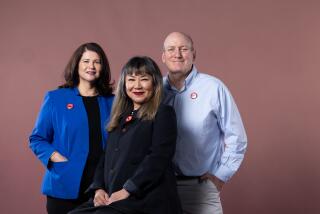Salvadoran Labor Dispute Splits Federation That Backed Duarte
- Share via
SAN SALVADOR — An important labor federation that helped bring President Jose Napoleon Duarte to power in last year’s Salvadoran elections has split in a power struggle apparently aggravated by an American labor group’s backing for one side.
The conflict undermines one of the pillars of U.S. policy in El Salvador--the strengthening of non-leftist unions so as to diminish support for Marxist rebels fighting the government. And leaders of the federation fear that the new splinter group is planning to join forces with a new right-wing political party.
Popular Democratic Unity, a federation of five unions with a membership of 250,000, has split, with dissidents forming the rival Democratic Workers’ Central. The new group was created with the help of the American Institute for Free Labor Development, an organization set up by the AFL-CIO to foster the growth of free labor unions in the hemisphere.
30-Day Deadline
Popular Democratic Unity on Wednesday announced a 30-day deadline for the American institute to drop its support for the Democratic Workers’ Central. If the American organization declines, the announcement said, Duarte will be asked to expel it from El Salvador.
In Washington, Jack Heberle, spokesman for the American Institute, discounted the controversy.
“A lot of charges are flying back and forth,” Heberle said. “What’s happening is that people on the outs are trying to become in. It’s a turf battle. Contrary to popular opinion, we can’t play kingmaker.”
The split began to develop last summer after Democratic Unity issued a statement aimed at pressuring Duarte to open peace talks with the leftist rebels. Some members of the labor group and the American Institute objected.
“One could say,” Heberle said, “that by pressing for negotiations with the guerrillas, they were pushing Duarte to the left.”
Vote-Buying Charges
Hostility increased in connection with this spring’s elections for the leadership of one of Democratic Unity’s largest member unions, the Salvadoran Communal Union. Ramon Mendoza ran against 10-year leader Samuel Maldonado and charged the American labor group with trying to buy votes. Heberle denied the charge.
Mendoza won, and the government validated his victory. While this was going on, the American Institute transferred its local director, a U.S. citizen, to another country.
Maldonado is now leader of the newly formed Democratic Workers’ Central, to which the American Institute switched its financial support. According to Heberle, the new group was to deal strictly with trade union matters and to stay out of politics.
Mendoza and Democratic Unity regard as ironic the American group’s stand against political activity, noting that it financed the labor movement’s effort on Duarte’s behalf last spring.
“Suddenly, we’re not of use to the Americans anymore,” Mendoza said.
Series of Promises
Democratic Unity’s support for Duarte was based on a series of promises known as the Social Pact. Among other things, Duarte promised to prosecute human rights cases, to begin peace negotiations with the rebels and to step up the land distribution effort. The Social Pact also spelled out the government posts that were to be given to union leaders.
Democratic Unity’s present leadership has continued to stand by Duarte but has expressed disappointment with his performance. No one has been brought to trial in connection with death-squad killings, and the peace talks and land reform are at a standstill. Several offices promised to the Democratic Unity are still unfilled, though Maldonado heads the national agrarian reform agency.
More to Read
Sign up for Essential California
The most important California stories and recommendations in your inbox every morning.
You may occasionally receive promotional content from the Los Angeles Times.













